- Home
- Sarah MacLean
Never Judge a Lady by Her Cover_The Fourth Rule of Scoundrels Page 12
Never Judge a Lady by Her Cover_The Fourth Rule of Scoundrels Read online
Page 12
Triumph turned dark. Cold. “Let him hang.”
One of Georgiana’s blond brows rose at the unfeeling words. That Tremley was a bastard was of little surprise. That his wife was a Boadicea was entirely the opposite. “Fair enough. Do you have proof?”
The marchioness reached into her bodice and extracted several pieces of torn paper, singed around the edges. She thrust them in Georgiana’s direction. “Show him these.”
Georgiana opened the slips of paper, piecing them together on the red silk of her skirts. She scanned the incriminating text on them. Looked up at the wife. “How did you—”
“My husband is less intelligent than the King gives him credit for. He tosses his correspondence into the fire, but he does not wait to ensure that it is incinerated.”
“Then—” Georgiana began.
Imogen finished the sentence. “There are dozens more.”
Georgiana was silent for a long moment, considering the implications of this woman. Of her stolen letters. Of the way they might help her this very night.
They would win her Duncan West’s help and, by extension, they would secure her future and that of her daughter.
New information always gave her a heady thrill, but this—it was a good day.
“I am certain I speak for Chase when I say, ‘Welcome to The Other Side.’”
Lady Tremley smiled then, and the expression opened her, removed the weathered lines of her face. Returned her youth.
“You are welcome to stay,” Georgiana said.
“I should like to explore a bit. Thank you.”
The lady did not understand. “Longer than an evening, my lady. The Other Side is not simply a place to game. If you wish sanctuary, we can provide it.”
The smile disappeared. “I don’t require it.”
Georgiana cursed the world into which they were born—where women had little choice but to accept the danger in their everyday lives. The great irony of ruin was this—once survived, it brought freedom with it. Not so for women of propriety, of good standing. Of good marriage.
Bad marriage, more like.
Georgiana nodded, standing and smoothing her skirts. She had witnessed this particular circumstance enough times that she knew better than to force the issue. “If you ever do . . .” She trailed off, letting the rest of the sentence hang between them.
Lady Tremley did not speak, but she did stand.
Georgiana opened the door, and gestured into the lush hallway beyond. “The club is yours, my lady.”
Chapter 8
. . . The Fashionable Hour grows ever more fashionable, however, with Lady G— in attendance this week along with her charming Miss P—. The two will soon make the sloping hills of Hyde Park the only place to be seen, this author has no doubt . . .
. . . How the mighty have fallen! The Duke of L— has been seen pushing a pram through Mayfair! For a man so known for doing other, more violent things with his hands, these authors wish there were an artist present for this particular event, as we would like to have seen it commemorated in oil . . .
The gossip pages of the Weekly Courant,
April 26, 1833
There was nothing worse than gossip pages. It did not matter that they made him a fortune.
Duncan West sat in his office on Fleet Street, considering the next issue of The Scandal Sheet.
The paper was his first business endeavor, started years earlier when he’d first landed in London. He’d designed it to capitalize on Society’s ridiculous interests in clothing and courtship, scandal and scoundrel. And to capitalize on the commoners’ universal interest in Society.
It had worked; the first paper made him scads of money—everything necessary to begin his second, infinitely more worthwhile paper, the News of London. It never failed to surprise and discourage him, however, that scandal had always and would always sell better than news and entertain more than art.
He knew he was the worst kind of hypocrite, after all, it was the paper he had to thank for his entire empire, but it did not make him loathe the business any less. Most days, he paid no attention to the contents of the rag, allowing his second in command to handle its business and content. But today the item that dominated the pages reserved for “Scandal of the Season,” was written and placed by West alone. It was a shot over the bow in the battle for Lady Georgiana Pearson’s marriage match.
He scanned the text, checking for misprints or unfortunate word choices. Unlike most who succumb to her fate, this lady has survived with cleverness, intelligence, and temerity.
No. None of those three words would work. While they suited Georgiana to a T, they would not call to the ton. Indeed, Society did not hold in high regard any of the traits that made the lady in question so captivating.
And damned if she wasn’t tremendously captivating.
He wished he could say that it was because of the kiss. Which he should not have pursued, and he certainly should not have allowed to continue beyond what was chaste.
Except there was nothing about the woman that made a man think of chastity. And it was not even the mask of Anna that tempted the most. It was the other—Georgiana, the freshness of her face, the brightness of her eyes. When he’d had the woman in his arms on the floor of the casino, he’d wanted to tear the ridiculous wig from her head and loose her blond waves and make love to the real woman beneath all the pomp and padding.
Not that she required padding.
She was rather perfectly padded as she was.
He shifted in his chair at the thought, returning his attention to the paper in his hand. Which did not help to put the lady out of his mind, as she was the subject of the damn paper.
A few strokes of red ink and cleverness became charm, intelligence became elegance and temerity became grace. Not incorrect as descriptors of Lady Georgiana, but certainly not as accurate as his former choices.
As others: beautiful, fascinating, unbearably tempting.
More than she seemed.
He set the draft on his desk and leaned back, closing his eyes and pressing finger and thumb to the bridge of his nose. She was dangerous. Altogether too dangerous. He should put someone else on the story and vow never to see her again.
“Sir.”
He looked up to find Marcus Baker, his secretary and general man of service, in the doorway. He waved him in. “Enter.”
The man set a stack of newsprint on the desk, topped with a collection of envelopes. “Tomorrow’s news and today’s mail,” Baker said before adding, “And word is that Viscount Galworth owes thousands to The Fallen Angel.”
West shook his head. “It’s not news.”
“He is trying to marry his daughter off to a wealthy American.”
He met his secretary’s gaze. “And?”
Baker nodded to a large envelope on the desk. “Chase sends proof that the viscount has been throwing horse races.”
“That could be news,” West said, opening the letter and turning his attention to the stack of papers inside.
It was remarkable what Chase knew.
West tutted his disapproval. “Galworth has made Chase very angry.”
“The Angel does not like its debts to go unpaid.”
“Which is why I have always taken great care not to go into debt at the Angel,” West said, idly, setting aside the information and turning to a note at the top of the pile that caught his attention. He slipped it free of the rest of the mail and reached for a letter opener, an unpleasant knot forming deep in him as he broke the seal and read the simple message.
I understand you’ve made a new friend.
Where is my article? I grow impatient.
It was unsigned, as messages in the Earl of Tremley’s hand always were. He folded the page and held it in a nearby candle flame, letting the frustration and anger that always came with these missives—filled with entitled demands that he could not help but accommodate—ebb as the fire licked up the edges of the note. He could put off writing the piece on the war f
or a few days, perhaps a week but he needed Chase’s proof, and soon.
He tossed the burning letter into the metal wastebasket at his feet, watching the flames consume the message before he turned back to Baker, who had yet to take his leave. “What else?”
“Your sister, sir.”
“What about her?”
“She is here.”
He gave Baker a blank stare. “Why?”
“Because you promised to take me for a ride,” his younger sister announced from the doorway.
Cynthia West was intelligent and bold and thoroughly unruly when she wanted to be. It was no doubt his fault, as he’d spoiled her for the last thirteen years, since he’d had the funds to do so. Cynthia believed, in the remarkable way that young women could, that the world was and should be at her feet.
And that world included her brother.
“Damn,” he said. “I forgot.”
She entered, removing her cloak, and seated herself in a small chair on the other side of his desk. “I assumed you would, which is why I am here and not at home, waiting to be collected.”
“I’ve three newspapers that print tonight.”
“Then it does seem like poor planning that you have promised me a ride today.”
He narrowed his gaze on her. “Cynthia.”
She turned to Baker. “Is he always so irritable?”
Baker knew better than to answer the question, instead taking his leave of the whole situation with a quick bow. “Smart man,” West said.
When the door closed behind the secretary, his sister said, “You know, I don’t think he likes me.”
“Probably not,” he said, rifling through the papers Baker had brought. “Cynthia, I can’t—”
“No,” she said. “You’ve canceled these particular plans three times, now.” She stood. “It is the fashionable hour. I wish to be fashionable. For once. Come, Duncan. Humor your poor, unmarried, spinster sister.”
“Unmarried spinster is redundant,” he said, enjoying her look of exasperation.
“Would you accept bored spinster sister instead?”
He shook his head. “Entertaining you is not my job. I’m required to entertain the rest of Britain first.”
She moved to the window of the office. “As though you haven’t a hundred underlings who can check spelling or whatever it is you do all day.”
He raised a brow. “It’s a bit more than that.”
She waved a hand dismissively. “Yes, I know. You run a veritable empire from behind that desk.”
He didn’t like to brag. “I do, rather.”
“There are Society pages in every one of your papers, and one of the things is entirely comprised of scandal. A ride in Hyde Park during the season is practically business.”
“It’s nowhere near business,” he clarified.
“Shouldn’t you allow me to be seen? Are you not concerned about my marriage prospects? I’m twenty-three, for heaven’s sake. On the shelf!”
“By all means, find a husband. I’ve scores of eligible bachelors working here. Choose one of them. Any one you please. Choose Baker. He’s a good worker.”
She pressed a hand to her breast. “A good worker. My heart. I can hardly bear its pounding.”
“He’s all his teeth, and a brain in his head.”
“High praise, indeed.”
“I don’t know what women want.” Georgiana Pearson seemed to be interested in nothing but a title.
Not that he cared what the woman wanted.
What had he been saying? Ah. Yes. Cynthia.
He waved a hand at the door. “Choose any man in the building. Just don’t make me go riding today.”
“I’ve half a mind to take you up on that, just to see you change your mind.” She swung her cloak around her shoulders. “You promised, Duncan.”
And there, for a moment, she was the five-year-old he’d scooped onto that horse twenty years ago, promising her that they’d go somewhere safe—somewhere their life would be better. Where they would be strong.
He’d made good on those promises.
And so he would make good on this one.
Within the hour, they were in Hyde Park, barely moving in the crush of the afternoon ride. Rotten Row—aptly named, in West’s estimation—was filled with the throngs of aristocrats and landed gentry who had returned to London for the season, dissatisfied with their pallid, whiled-away winters in the far reaches of Britain, and desperate for color—a blush of gossip.
West nodded to the Earl of Stanhope, who came alongside the carriage on a stunning black horse. “My lord.”
“West. I saw your editorial in the News in favor of the Factory Act. Well put. Children shouldn’t work more than we do.”
“Children shouldn’t work at all,” West replied. “Though I shall take the act’s passage as a sound first start—if word of our combined voices does not frighten away those who might otherwise be inclined toward our views.” The earl was known for his impassioned speeches on the floor of the House of Lords.
Stanhope laughed. “Think of the damage we could do if you’d run for a seat in the House of Commons.”
A wind whipped through the park, as though the universe knew the truth—that West could never run for a seat in the Lower House. That he would not be allowed to converse with earls if his truths were known, and that at some point, at any point, his secrets could become public. For a secret was only a secret until two people knew it.
And in his case, two people knew it. “Too much damage, my lord.”
The earl seemed to sense the shift in the conversation, and he tipped his hat in their direction before heading off down the path.
West and his sister rode in silence for long minutes, until another wind blew, and Cynthia decided to lighten the mood in the curricle. Holding on to her enormous hat, she smiled wide at a passing group of doyennes of the ton. She spoke with a bright, happy voice. “It’s a beautiful day for a ride.”
“It’s grey and threatening to rain.”
She smiled. “It’s London in March, Duncan. That’s practically blue sky.”
He narrowed his gaze on her. “How is it that we are siblings and yet you are so damn impractical?”
“You say impractical, I say cheerful.” He did not reply, and so she offered, “I suppose the gods were smiling down upon you when they delivered you a baby sister.”
The gods were doing no such thing at the time of her arrival. But he still remembered that day, covered in tar, blisters on his young hands, sent into the laundry where his mother lay hidden in a corner on a makeshift pallet of old blankets, holding a tiny baby.
The memory came without warning. Go on, Jamie, hold your sister.
He had, taking the little mewling bundle. She’d been wrapped in the master’s shirt, one in need of mending. He’d barely seen the baby for that shirt. He’ll be angry that you’ve ruined his shirt.
There’d been sadness in his mother’s eyes when she’d replied, You let me worry about him.
He’d unwrapped the shirt then, to get a good look at this little creature that had been identified as his sister, with a headful of brown hair and the bluest eyes he’d ever seen.
He extinguished the memory before it went too far. “You looked like a goblin.”
She turned shocked eyes on him. “I did not!”
“Maybe not. Perhaps it was more like an old man—all red and blotchy, as though you’d been in the sun or in your cups for too long.”
She laughed. “That’s a horrible thing to say.”
“You grew out of it.” He shrugged one shoulder and added, so no one nearby could hear him, “And the first time I held you, you pissed on me.”
“I’ve no doubt you deserved it!” she said, indignant.
He smiled. “You grew out of that, too, thank goodness.”
“I’m beginning to think that I should not have invited you for this ride,” she said. “It’s not nearly so rewarding as I thought it would be.”
“Then I have achieved my goal.”
She scowled at him before her attention turned to two ladies riding ahead of them, heads bent in the telltale sign of gossip. “Now shush. Those two look like they have something to say.”
“You realize that your brother has the line on all the significant gossip of the ton? You receive at least three gossip rags to the house a week.”
She waved away his words. “It’s no fun reading it with the rest of the world. Get closer. And pretend as though we are conversing.”
“We are conversing.”
“Yes, but if you’re talking I can’t hear them. So pretend.”
The dirt path was packed with aristocrats and gentry, all here for the same reason Cynthia was here, and so the whole damn group was moving at a snail’s pace, which made it perfectly easy to eavesdrop. The gossip shared on Rotten Row was never very valuable, in part because everyone on Rotten Row had heard it already. Nevertheless, he slowed to a creep so his sister could listen to the ladies, now next to them, despite lacking any semblance of interest in their conversation.
“I heard that she’s got her eye on Langley,” one said.
“He’d be a tremendous catch for her, but I don’t think he’d marry into such a family,” the other opined.
“‘Such a family,’” came the unconvinced reply. “She’s the Duke of Leighton for a brother, and Ralston through the duke.”
Suddenly, West was very interested in the conversation.
“They’re speaking of Lady Geo—”
He raised a hand and Cynthia stopped speaking. For once.
“They may have titles, but they shouldn’t matter when you consider the rest of the story—Leighton’s duchess has been a scandal from the start.”
“She’s received everywhere,” the first pointed out.
“Of course she is. She’s a duchess. And a rich one at that. But it doesn’t mean people wish her presence. Italian. Catholic. And a bastard.”
“What a horrible woman,” Cynthia whispered, leaning closer.
It was only years of practice that kept West from doing the same. The woman in question was Lady Holborn, a wicked gossip and a terrible person if talk was to be believed. The other was Lady Davis, not the most prized guest at a gathering, but in comparison, a veritable saint, it seemed.

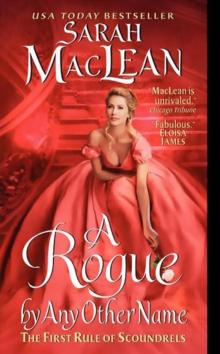 A Rogue by Any Other Name
A Rogue by Any Other Name One Good Earl Deserves a Lover
One Good Earl Deserves a Lover Ten Ways to Be Adored When Landing a Lord
Ten Ways to Be Adored When Landing a Lord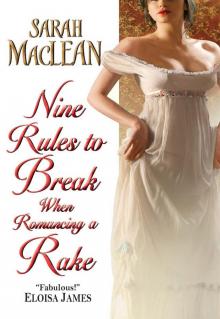 Nine Rules to Break When Romancing a Rake
Nine Rules to Break When Romancing a Rake A Duke Worth Falling For
A Duke Worth Falling For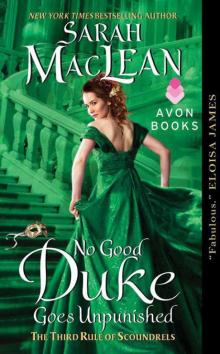 No Good Duke Goes Unpunished
No Good Duke Goes Unpunished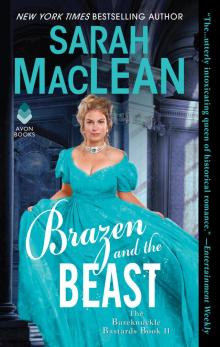 Brazen and the Beast
Brazen and the Beast Never Judge a Lady by Her Cover
Never Judge a Lady by Her Cover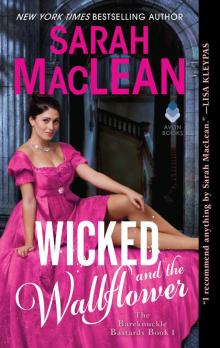 Wicked and the Wallflower
Wicked and the Wallflower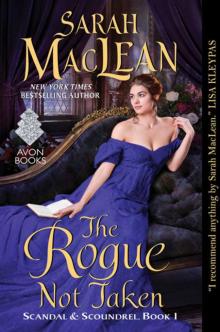 The Rogue Not Taken
The Rogue Not Taken Bombshell
Bombshell A Scot in the Dark
A Scot in the Dark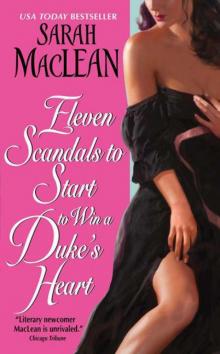 Eleven Scandals to Start to Win a Duke's Heart
Eleven Scandals to Start to Win a Duke's Heart Naughty Brits: An Anthology
Naughty Brits: An Anthology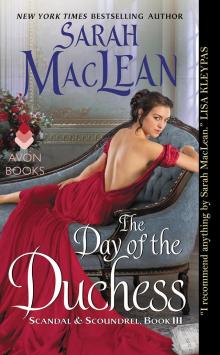 The Day of the Duchess
The Day of the Duchess Never Judge a Lady By Her Cover: Number 4 in series (The Rules of Scoundrels series)
Never Judge a Lady By Her Cover: Number 4 in series (The Rules of Scoundrels series)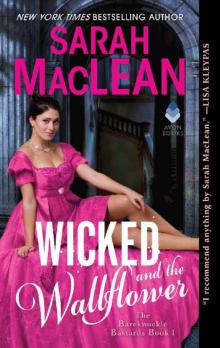 Wicked and the Wallflower: Bareknuckle Bastards Book 1
Wicked and the Wallflower: Bareknuckle Bastards Book 1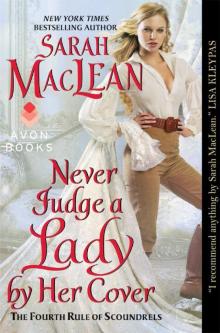 Never Judge a Lady by Her Cover_The Fourth Rule of Scoundrels
Never Judge a Lady by Her Cover_The Fourth Rule of Scoundrels